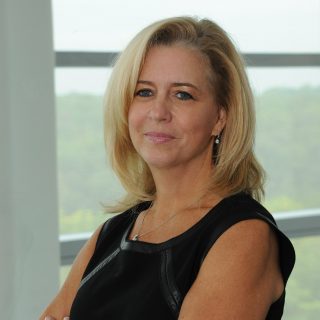
The pursuit to engage more young people in STEM-related careers extends to the national offices of the highest level.
Ellen McCarthy, Chief Operating Officer of the National Geospatial-Intelligence Agency (NGA) spoke with WashingtonExec on NGA’s STEM initiatives at the local community level, how the agency is partnering with industry members, and why industry, government and academia need to do a better job at ‘selling’ STEM careers to kids.
We also asked McCarthy about her personal involvement in fostering her community’s local STEM pipeline as well as those in the Intelligence Community who have served as mentors and role models throughout her career.
WashingtonExec: How is the NGA involved with STEM initiatives at a local and/or national level?
Ellen McCarthy: The entire leadership team at NGA view STEM initiatives among our highest priorities. We have a very strong program called Partnerships in Education, where we conduct outreach at the elementary, middle and high school levels. We’ve represented the agency at seven different STEM fairs this year, reaching students at the high school, middle school and elementary school level in seven different counties. One of our most successful science fairs was held here at NGA in Springfield. [Recently-retired] Director [Letitia] Long and a few agency analysts served as judges at that particular fair.
You really need to get kids interested in STEM in elementary school by showing them all the exciting opportunities that sciences, technology, engineering and math can provide them throughout their education towards their future careers.
WashingtonExec: The word STEM brings out different passions for different professionals. Some professionals focus on the local STEM pipeline while others choose to focus on engaging young girls or monitories with future STEM careers. Is there a particular demographic or STEM topic that NGA tends to focus its resources towards?
Ellen McCarthy: We’re actively involved in supporting STEM initiatives for all, young men, young women of different races, ethnicities and backgrounds. I’ll tell you that [former]Director Long, is an incredible role model for women. We are often asked to discuss NGA’s view and engagement in getting women into STEM careers and that absolutely is a huge focus area, but it’s not our only focus area. I would say that we are involved, in general, in getting all kinds of people involved. An example is for the 2014-2015 academic school year, we’ve partnered with the Blue Ridge Virtual Governor’s School, which is a consortium of schools in the central Virginia area. This consortium is really focused on STEM endeavors, communications ethics and problem solving. It’s one of our key partnerships in this fiscal year, and interestingly enough, 50 percent of those participants are women.
“I think it’s fair to say that NGA, as well as the entire intelligence community, recognizes that maintaining the flow of people into these career fields is really a national security priority.”
WashingtonExec: Do you all work with any industry partners?
Ellen McCarthy: Our senior executives in academic outreach and STEM, Dr. Lenora Gant, is an incredible advocate of STEM programs, not only because it is a part of her job, but because it is something she is very passionate about. She meets quarterly with government and industry partners to brainstorm some best practices and to implement some approaches to conduct some outreach activities.
Our senior leadership team here at NGA are always out and about — not only involved in recruiting, but encouraging industry to highlight internship opportunities, to highlight other means for collaborating.
We maintain very close working relationships with industry partners. I came from an industry association who focused a lot of its time and energy on recruiting young people, not only into STEM careers, but into the intelligence community. We participated in a “data jam” on STEM workforce quality flow and diversity, which was sponsored by the White House Office of Science and Technology Policy back in January and had very good participation there.
I think it’s fair to say that NGA, as well as the entire intelligence community, recognizes that maintaining the flow of people into these career fields is really a national security priority.
WashingtonExec: What are some internship opportunities for students at the high school, college or post-college levels?
Ellen McCarthy: NGA has a very active and competitive program for hiring college interns to introduce them to geospatial systems and to educate them in how it is increasingly integrated into our day-to-day lives. We regularly will hire one year, temporarily appointments. You must commit to a 10-week session in the summer. Students who are attending local schools also get an opportunity to work on their breaks at NGA. One of the benefits is not only is it a chance for us to see them, but it’s an opportunity for them to see us. Upon graduation, students who complete the program can be hired in non-competitively permanent appointments.
WashingtonExec: What do you see as the largest misconception bias of STEM careers?
Ellen McCarthy: We need to sell our young people on STEM careers and really highlight what it means to choose a major in a science-technology field. We as a workforce really need to focus on the cool factor because there are some incredible opportunities that await future professionals, should they take on some of these majors. It’s a fascinating area of work and, as I indicated, it’s a national security priority. Those who focus in these areas, the mission that they’re going to support, the kinds of opportunities that are going to be provided for them, are second to none. To be able to support this country in the national security mission, it really is just an incredible career field.
The other under-promoted aspect of a STEM is the benefit and the flexibility that comes with a STEM job. The benefits really are unparalleled. There’s good pay — whether you’re pursuing a career in the private sector or public sector — there’s flexible time, it really is just a great career field, and I don’t think our young people necessarily understand that. They look at engineering as their grandfather’s engineering program, and it’s not that at all. I explained to my daughter that it’s not just engineering and math, but as you look at data sciences, social media analysts and data curators, there’s a plethora of opportunities that are out there. We really need to do a better job of educating our young people as to what those opportunities are.
WashingtonExec: How are you personally involved in increasing the STEM pipeline?
Ellen McCarthy: I am a passionate advocate for girls in science in my personal capacity. I was President of my school’s PTA, I regularly go out in my personal capacity and try to engage schools and local organizations. I told my daughter she will major in STEM programs for all the reasons we discussed — we need girls to do this, it is a national security prerogative, we need our young people to do this.
WashingtonExec: What is your opinion on STEAM and incorporating the arts into different STEM programs?
Ellen McCarthy: From early on, virtually every job opportunity that came open to me was very technical. I think I learned at a very early age that understanding technology and understanding math was going to be critical to my future.
My first job in the intelligence community was studying Soviet submarine design philosophy and materials used for the building of Soviet submarines. I had to learn it the hard way, but I’ll tell you, if I had the chance to do it the other way, I would’ve majored in engineering or science, but I took the longer, harder road.
WashingtonExec: Many studies show that girls who have a female mentor in a STEM field are much more likely to pursue a STEM career when compared to girls who have a male mentor in the STEM field. Who have served as mentors throughout your career?
Ellen McCarthy: I’ve had a series of mentors throughout my career, and for the first 20 years of my career, my mentors were mostly men. When I was getting more senior in my career, I found that it was the women in my life who really made an incredible difference. Our now-former director, Letitia Long, an engineer, she played an incredible role in so many of the jobs that I pursued. It was advice that she provided me that really gave me. She pushed me to go for things that I otherwise wouldn’t have gone for. I’m very grateful to her for that. Another woman who played an incredible role was Fran Townsend. Not only is she brilliant, but she’s not afraid to step forward and say it like it is. No matter where she was in her own career, she would always take the time to talk to me and continue to push me. I’m really grateful to those two women, but I don’t want to overshadow the men who played an incredible role. Our current Director of National Intelligence James Clapper, Dr. Steve Cambone. These men, there are so many others, I can’t even mention them all, really were incredible role models.
WashingtonExec: How do you think industry can better help NGA’s mission, or the IC as a whole, in terms of how they can focus on local STEM pipeline in the metro DC area?
Ellen McCarthy: I think we have some great partnerships with the private sector right now, and many of those programs we have in place. I think the private sector needs to continue their own internship programs and mentoring opportunities. The reality is the business of intelligence is done in partnership with the private sector, and we cannot hire or recruit all the people with all the skills that we need at the rate that we need them given the pace of technology development in data. So the reality is, supporting this incredible mission that we have really is done in partnership. It requires that private sector workforce and the public sector workforce be cutting edge and the best we can be.


